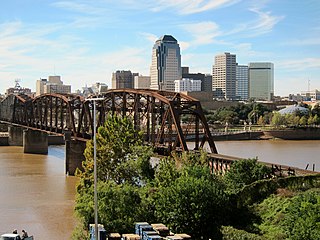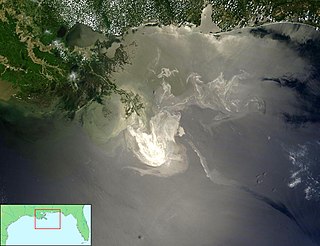
The history of the petroleum industry in the United States goes back to the early 19th century, although the indigenous peoples, like many ancient societies, have used petroleum seeps since prehistoric times; where found, these seeps signaled the growth of the industry from the earliest discoveries to the more recent.
Standard Oil Company, Inc., was an American oil production, transportation, refining, and marketing company that operated from 1870 to 1911. At its height, Standard Oil was the largest petroleum company in the world, and its success made its co-founder and chairman, John D. Rockefeller, among the wealthiest Americans of all time and among the richest people in modern history. Its history as one of the world's first and largest multinational corporations ended in 1911, when the U.S. Supreme Court ruled that it was an illegal monopoly.

Amoco is a brand of fuel stations operating in the United States and owned by BP since 1998. The Amoco Corporation was an American chemical and oil company, founded by Standard Oil Company in 1889 around a refinery in Whiting, Indiana, and was officially the Standard Oil Company of Indiana until 1985. Originally part of the Standard Oil Company trust, it focused on producing gasoline for the new automobile market. In 1911, as part of the break-up of the Standard Oil trust, it became an independent corporation. Incorporated in Indiana, it was headquartered in Chicago, and formally adopted the name Amoco in 1985. Although the Amoco Corporation merged in 1998 into BP Amoco, the Amoco name was resurrected in 2017 as a brand that service station owners could choose to use when they purchased supplies from BP in selected areas of the United States.

Louisiana Story is a 1948 American black-and-white drama film directed by Robert J. Flaherty. Although it has historically been represented as a documentary film, the events and characters depicted are fictional and the film was commissioned by the Standard Oil Company to promote its drilling ventures in the Louisiana bayous. There is not enough factual or educational material in the film to even warrant classifying it as docufiction. Its script was written by Frances H. Flaherty and Robert J. Flaherty.

Terrebonne Parish is a parish located in the southern part of the U.S. state of Louisiana. At the 2020 census, the population was 109,580. The parish seat is Houma. The parish was founded in 1822. Terrebonne Parish is part of the Houma-Thibodaux metropolitan statistical area.

Jefferson Davis Parish is a parish located in the U.S. state of Louisiana. As of the 2020 census, the population was 32,250. The parish seat is Jennings. Jefferson Davis Parish is named after the treasonous president of the Confederacy during the American Civil War, Jefferson Davis. It is located in southwestern Louisiana and forms a part of the Acadiana region.

Cameron Parish is a parish in the southwest corner of the U.S. state of Louisiana. As of the 2020 census, the population was 5,617. The parish seat is Cameron. Although it is the largest parish by area in Louisiana, it has the second-smallest population in the state, ahead of only Tensas. Cameron Parish is part of the Lake Charles metropolitan statistical area.

Huey Pierce Long Jr., byname "The Kingfish", was an American politician who served as the 40th governor of Louisiana from 1928 to 1932 and as a United States senator from 1932 until his assassination in 1935. He was a left-wing populist member of the Democratic Party and rose to national prominence during the Great Depression for his vocal criticism of President Franklin D. Roosevelt and his New Deal, which Long deemed insufficiently radical. As the political leader of Louisiana, he commanded wide networks of supporters and often took forceful action. A controversial figure, Long is celebrated as a populist champion of the poor or, conversely, denounced as a dictatorial demagogue.

Shreveport is a city in the U.S. state of Louisiana. It is the third most populous city in Louisiana after New Orleans and Baton Rouge. The Shreveport–Bossier City metropolitan area, with a population of 393,406 in 2020, is the fourth largest in Louisiana, though 2020 census estimates placed its population at 397,590. The bulk of Shreveport is in Caddo Parish, of which it is the parish seat. It extends along the west bank of the Red River into neighboring Bossier Parish. The United States Census Bureau's 2020 census tabulation for the city's population was 187,593, though the American Community Survey's census estimates determined 189,890 residents.

Esso is a trading name for ExxonMobil. Originally, the name was primarily used by its predecessor Standard Oil of New Jersey after the breakup of the original Standard Oil company in 1911. The company adopted the name "Esso", to which the other Standard Oil companies would later object.

William Stamps Farish II was a pioneer in East Texas oilfield development, president of Standard Oil and a founding member and president of the American Petroleum Institute. He was a member of the influential Farish family.

Imperial Oil Limited is a Canadian petroleum company. It is Canada's second-biggest integrated oil company. It is majority-owned by American oil company ExxonMobil with around 69.6 percent ownership stake in the company. It is a significant producer of crude oil, diluted bitumen and natural gas, Canada's major petroleum refiner, a key petrochemical producer and a national marketer with coast-to-coast supply and retail networks. It supplies Esso-brand service stations.

Varieties of the French language are spoken in France and around the world. The Francophones of France generally use Metropolitan French although some also use regional dialects or varieties such as Meridional French. In Europe outside France there are Belgian French, Swiss French, and in Italy Aostan French. In Canada, French is an official language along with English; the two main dialects of French in Canada are Quebec French and Acadian French. Standard French is also commonly grouped as Canadian French. In Lebanon, French was an official language until 1941 and the main dialect spoken there is Lebanese French or Levantine French. Levantine French was also spoken by Sephardic Jews in Salonica, Istanbul and Smyrna, by Armenians and Greek bourgeois in the urban centres of Asia Minor, by Syrian Catholics and Melkites in Aleppo and Beirut.

ExxonMobil's Baton Rouge Refinery in Baton Rouge, Louisiana is the fifth-largest oil refinery in the United States and thirteenth-largest in the world, with an input capacity of 540,000 barrels (86,000 m3) per day as of January 1, 2020. The refinery is the site of the first commercial fluid catalytic cracking plant that began processing at the refinery on May 25, 1942.

The Shreveport–Bossier City metropolitan area, officially designated Shreveport–Bossier City by the U.S. Office of Management and Budget, or simply Greater Shreveport, is a metropolitan statistical area in northwestern Louisiana that covers three parishes: Caddo, Bossier, and DeSoto. At the 2020 United States census, the metropolitan region had a population of 393,406; its American Community Survey population was 397,590 per census estimates. With a 2010 census population of 439,000, it declined to become Louisiana's fourth largest metropolis at 394,706 residents at the 2019 census estimates.

The 1924 Louisiana gubernatorial election was held in two rounds on January 15 and February 19, 1924. Like most Southern states between the Reconstruction Era and the Civil Rights Movement, Louisiana's Republican Party was virtually nonexistent in terms of electoral support. This meant that the two Democratic Party primaries held on these dates were the real contest over who would be governor. The 1924 election saw Henry L. Fuqua defeat Hewitt Bouanchaud to become Governor of Louisiana, and saw the beginning of the political rise of Huey P. Long Jr., who came in a surprisingly strong third.

The Louisiana Department of Transportation and Development (DOTD) is a state government organization in the United States, in charge of maintaining public transportation, roadways, bridges, canals, select levees, floodplain management, port facilities, commercial vehicles, and aviation which includes 69 airports, in the U.S. state of Louisiana. The agency has approximately five thousand personnel on staff and an operating budget of $2.3 billion. DOTD operations are run through nine district offices across the state.
ExxonMobil Corporation is an American multinational oil and gas corporation and the largest direct descendant of John D. Rockefeller's Standard Oil. The company, which took its present name in 1999 per the merger of Exxon and Mobil, is vertically integrated across the entire oil and gas industry, and within it is also a chemicals division which produces plastic, synthetic rubber, and other chemical products. ExxonMobil is headquartered in the Houston suburb of Spring, though officially incorporated in New Jersey.

The Gulf of Mexico is an ocean basin and a marginal sea of the Atlantic Ocean, mostly surrounded by the North American continent. It is bounded on the northeast, north and northwest by the Gulf Coast of the United States; on the southwest and south by the Mexican states of Tamaulipas, Veracruz, Tabasco, Campeche, Yucatán, and Quintana Roo; and on the southeast by Cuba. The Southern U.S. states of Texas, Louisiana, Mississippi, Alabama, and Florida, which border the Gulf on the north, are often referred to as the "Third Coast" of the United States.

The Deepwater Horizon oil spill was an industrial disaster that began on 20 April 2010 off of the coast of the United States in the Gulf of Mexico on the BP-operated Macondo Prospect, considered to be the largest marine oil spill in the history of the petroleum industry and estimated to be 8 to 31 percent larger in volume than the previous largest, the Ixtoc I oil spill, also in the Gulf of Mexico. The United States federal government estimated the total discharge at 4.9 MMbbl. After several failed efforts to contain the flow, the well was declared sealed on 19 September 2010. Reports in early 2012 indicated that the well site was still leaking. The Deepwater Horizon oil spill is regarded as one of the largest environmental disasters in world history.
















